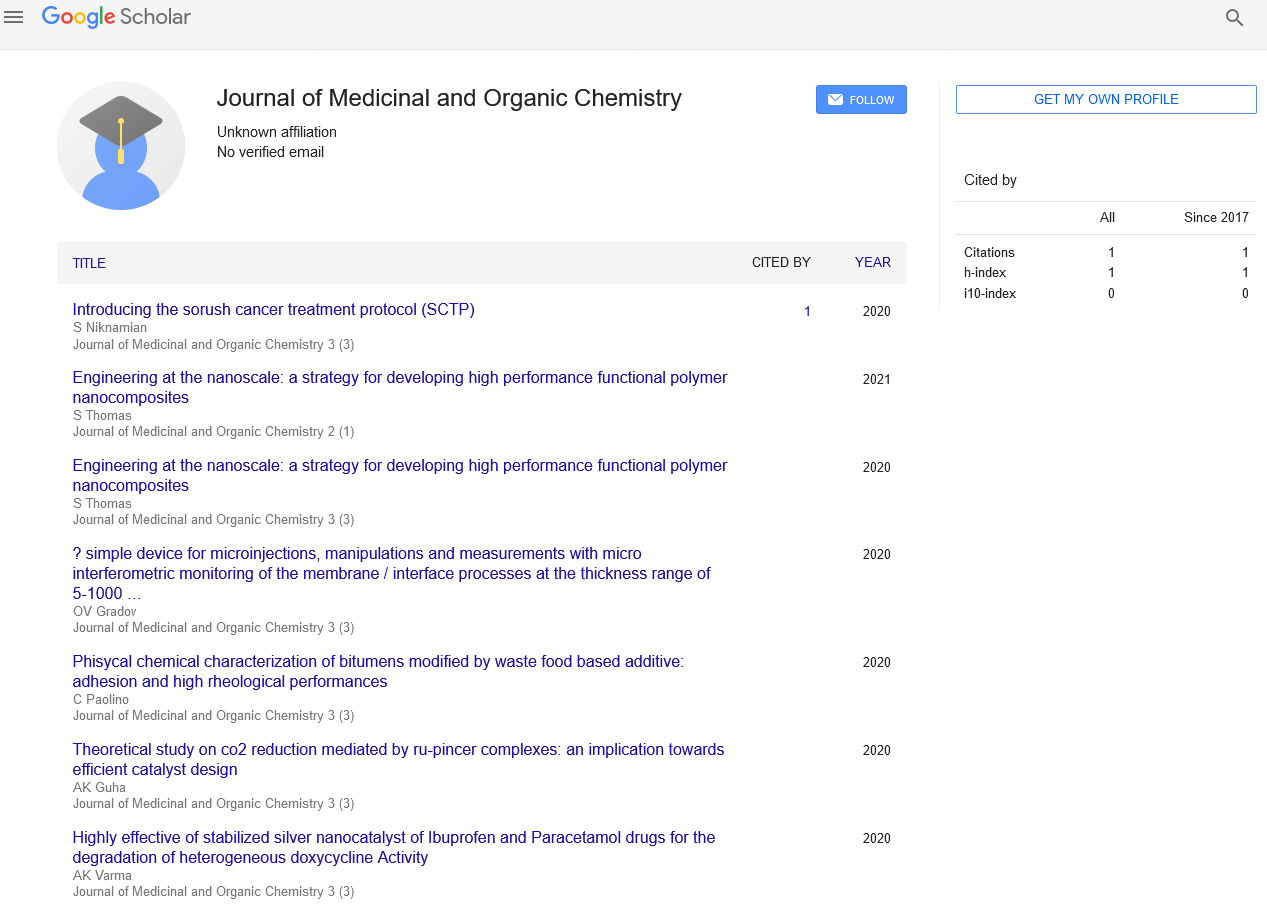Perspective - Journal of Medicinal and Organic Chemistry (2024) Volume 7, Issue 1
Unraveling the Intricacies of Immunology: A Journey into the Body's Defense Mechanisms
- Corresponding Author:
- Oshman Ahmad
Department of Immunology,
Karachi University,
Karachi,
Pakisthan
E-mail: Oshman@86789gmail.com
Received: 25-Jan-2024, Manuscript No. jmoc-24-126392; Editor assigned: 30-Jan-2024, PreQC No. jmoc-24-126392 (PQ); Reviewed: 13-Feb-2024, QC No. jmoc-24-126392; Revised: 22-Feb-2024, Manuscript No. jmoc-24-126392 (R); Published: 29-Feb-2024, DOI: 10.37532/jmoc.2024.7(1).177-178
Introduction
Immunology, the study of the immune system, is a captivating field that delves into the intricate mechanisms by which the human body defends itself against pathogens, while maintaining tolerance to self. It is a dynamic discipline that intersects biology, medicine and biochemistry, offering profound insights into the complexities of host-pathogen interactions and the development of immune responses.
Description
The immune system: Nature’s guardian
At the core of immunology lies the immune system, a remarkably sophisticated network of cells, tissues and organs working in harmony to protect the body. From the sentinel cells stationed in tissues to the circulating antibodies in the bloodstream, every component plays a pivotal role in safeguarding against invading microbes and maintaining health.
Cellular players: Unveiling the heroes of immunity
Central to the immune response are specialized cells, each endowed with unique functions tailored to combat specific threats. From the relentless phagocytes, engulfing and digesting foreign invaders, to the elegant T lymphocytes orchestrating targeted attacks, the cellular ensemble orchestrates a symphony of defense unparalleled in complexity.
Molecular warfare: Weapons of immunological defense
At the molecular level, immunology unveils an arsenal of weapons wielded by the immune system to neutralize pathogens. Antibodies, with their exquisite specificity, bind to foreign antigens, marking them for destruction or neutralization. Meanwhile, cytokines orchestrate communication between immune cells, coordinating their efforts with precision.
Innate versus adaptive immunity: A balancing act
Immunology elucidates the delicate balance between innate and adaptive immunity, two complementary branches of the immune system. The innate arm provides rapid, nonspecific defense against a broad range of pathogens, while adaptive immunity mounts tailored responses, characterized by specificity and memory, crucial for long-term protection.
Immunological memory: The key to lasting protection
One of immunology’s most intriguing phenomena is the establishment of immunological memory, whereby the immune system retains a memory of past encounters, enabling swifter and more robust responses upon re-exposure to familiar threats. This phenomenon underpins the effectiveness of vaccines and shapes our understanding of immune-mediated diseases.
The dance of immune regulation: Maintaining tolerance and balance
Immunology explores the intricate mechanisms of immune regulation, essential for preventing autoimmune diseases and allergic reactions. Tolerance checkpoints ensure self-recognition, preventing misguided attacks on the body’s own tissues, while regulatory T cells act as guardians of immunological equilibrium, suppressing excessive immune responses.
Immunopathology: Unraveling the mysteries of immune-mediated diseases
Immunology sheds light on the underlying mechanisms of immune-mediated diseases, from autoimmune disorders like rheumatoid arthritis to hypersensitivity reactions such as asthma and allergies. Through unraveling the complexities of dysregulated immune responses, immunologists strive to devise novel therapeutic strategies to alleviate human suffering.
The immune system in health and disease: A multifaceted perspective
Immunology provides a multifaceted perspective on human health, extending beyond infectious diseases to encompass cancer immunosurveillance, transplantation immunology and immunotherapy. By harnessing the power of the immune system, researchers aim to revolutionize the treatment of diverse medical conditions, offering hope to patients worldwide.
Frontiers in immunological research: Pushing the boundaries of knowledge
Immunology is a dynamic field characterized by ongoing exploration and discovery. From cutting-edge technologies like single-cell sequencing to revolutionary immunotherapies like CAR-T cell therapy, researchers continually push the boundaries of knowledge, unraveling new mysteries of the immune system and paving the way for groundbreaking medical interventions.
Conclusion
Immunology stands as a beacon of scientific inquiry, illuminating the inner workings of the immune system and shaping our understanding of health and disease. From the cellular battlegrounds to the molecular skirmishes, its revelations deepen our appreciation for the marvels of biological defense and inspire hope for a healthier future. As we journey further into the realms of immunological discovery, the mysteries of the immune system await our unraveling, promising insights that may one day transform the landscape of medicine.

